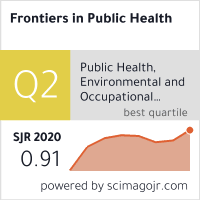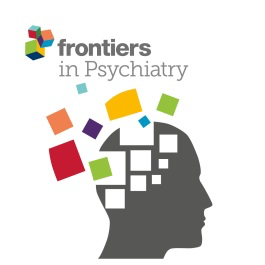Perimenopausal Depression
How to submit an article:
- Registered users can submit any published journal article that has a unique DOI (Digital Object Identifier) name or link to Research Hub.
- For example, you can paste the full DOI link:
https://doi.org/10.1109/5.771073or just the DOI name:10.1109/5.771073into the field above and click submit. - The person who is first to submit a valid article to Research Hub will forever be credited for it, and every article submission earns you +6 Research Points.
Related Topics
Published research studies are articles that present the findings of original research that has undergone a peer-review process and has been made publicly available in scholarly journals, books or other media.

Acupuncture for comorbid depression and insomnia in perimenopause: A feasibility patient-assessor-blinded, randomized, and sham-controlled clinical trial
2023 Feb 06 Frontiers in Public Health Zhao FY, Zheng Z, Fu QQ, Conduit R, Xu H, Wang HR, et al.
Randomised Controlled Trial Perimenopausal DepressionAcupuncture can improve both perimenopausal depression and insomnia with short-medium term effects while being a safe treatment.

Acupuncture as an Independent or Adjuvant Management to Standard Care for Perimenopausal Depression: A Systematic Review and Meta-Analysis
2021 May 28 Frontiers in Psychiatry Zhao FY, Fu QQ, Kennedy GA, Conduit R, Zhang WJ, Zheng Z
Systematic Review Meta-Analysis HRT Perimenopausal DepressionAcupuncture alone or combined with standard care was associated with significant improvements in perimenopausal depression and reductions of other menopausal symptoms.

Effectiveness and Safety of Acupuncture for Perimenopausal Depression: A Systematic Review and Meta-Analysis of Randomized Controlled Trials
2020 Jan 20 Evidence-Based Complementary and Alternative Medicine Xiao X, Zhang J, Jin Y, Wang Y, Zhang Q
Systematic Review Meta-AnalysisThe use of acupuncture in the management of perimenopausal depression is safe, effective, and offers long-lasting benefits relative to antidepressants and HRT.
Research insights are moderated by the Research Hub team and offer an at-a-glance overview of interesting research findings.

2023 Frontiers in Public Health
Acupuncture can improve both perimenopausal depression and insomnia with short-medium term effects while being a safe treatment.
Randomised Controlled Trial
Acupuncture for comorbid depression and insomnia in perimenopause: A feasibility patient-assessor-blinded, randomized, and sham-controlled clinical trial
Zhao FY, Zheng Z, Fu QQ, Conduit R, Xu H, Wang HR, et al.

2021 Frontiers in Psychiatry
Acupuncture alone or combined with standard care was associated with significant improvements in perimenopausal depression and reductions of other menopausal symptoms.
Systematic Review HRT
Acupuncture as an Independent or Adjuvant Management to Standard Care for Perimenopausal Depression: A Systematic Review and Meta-Analysis
Zhao FY, Fu QQ, Kennedy GA, Conduit R, Zhang WJ, Zheng Z

2020 Evidence-Based Complementary and Alternative Medicine
The use of acupuncture in the management of perimenopausal depression is safe, effective, and offers long-lasting benefits relative to antidepressants and HRT.
Systematic Review
Effectiveness and Safety of Acupuncture for Perimenopausal Depression: A Systematic Review and Meta-Analysis of Randomized Controlled Trials
Xiao X, Zhang J, Jin Y, Wang Y, Zhang Q
Review Articles
Review articles summarise and critically evaluate the current state of research on a specific topic or field by synthesising multiple primary research studies.

Acupuncture as an Independent or Adjuvant Management to Standard Care for Perimenopausal Depression: A Systematic Review and Meta-Analysis
2021 May 28 Frontiers in Psychiatry Zhao FY, Fu QQ, Kennedy GA, Conduit R, Zhang WJ, Zheng Z
Systematic Review Meta-Analysis HRT Perimenopausal DepressionAcupuncture alone or combined with standard care was associated with significant improvements in perimenopausal depression and reductions of other menopausal symptoms.

Effectiveness and Safety of Acupuncture for Perimenopausal Depression: A Systematic Review and Meta-Analysis of Randomized Controlled Trials
2020 Jan 20 Evidence-Based Complementary and Alternative Medicine Xiao X, Zhang J, Jin Y, Wang Y, Zhang Q
Systematic Review Meta-AnalysisThe use of acupuncture in the management of perimenopausal depression is safe, effective, and offers long-lasting benefits relative to antidepressants and HRT.
Good comparison with HRT and antidepressants — 2 Sep 2021
Clinical Trials
Clinical trials are research studies that involve people and are conducted to evaluate the safety and efficacy of new treatments or interventions, such as drugs, medical devices, or behavioural therapies.
Study Protocols
Published study protocols are detailed plans that outline the objectives, methodology, statistical analyses, and organisation of a research study that have been made publicly available for others to review and use as a reference.
Presentation Slides

Randomised Controlled Trial
Acupuncture can improve both perimenopausal depression and insomnia with short-medium term effects while being a safe treatment.
Zhao FY, Zheng Z, Fu QQ, Conduit R, Xu H, Wang HR, Huang YL, Jiang T, Zhang WJ, Kennedy GA

Systematic Review
Acupuncture alone or combined with standard care was associated with significant improvements in perimenopausal depression and reductions of other menopausal symptoms.
Zhao FY, Fu QQ, Kennedy GA, Conduit R, Zhang WJ, Zheng Z

Systematic Review
The use of acupuncture in the management of perimenopausal depression is safe, effective, and offers long-lasting benefits relative to antidepressants and HRT.
Xiao X, Zhang J, Jin Y, Wang Y, Zhang Q
Executive Summary
Write an executive summary in the form of a blog article on the topic of "Research into Chinese medicine treatment for Perimenopausal Depression" summarising the research below and using language that can be easily understood by patients and avoiding medical jargon using a professional and caring tone of voice.
Write an executive summary in the form of a blog article on the topic of "Researched Chinese medicine treatments for Perimenopausal Depression" summarising the research below in an objective and easy to understand way, and using language that can be easily understood by patients. Group the article into Chinese medicine treatments first, followed by nutrition and other treatments. Avoid using medical jargon and use a professional and caring tone of voice.
Write me a concise but easy to understand executive summary on the topic of "Chinese medicine treatments for Perimenopausal Depression" based on the following research that I will give you. Your summary should be 2 paragraphs long in Australian English spelling and include references to the studies.
A Randomised Controlled Trial published in 2023 in the journal Frontiers in Public Health found that Acupuncture can improve both perimenopausal depression and insomnia with short-medium term effects while being a safe treatment. The experiment involved seventy eligible participants who were randomly assigned to either a real-acupuncture (RA) or a sham-acupuncture (SA) group. They were given 17 sessions of either RA or SA treatments over an 8-week timeframe. The primary outcomes for mood and sleep were evaluated using the 17-item Hamilton Depression Rating Scale and the Pittsburgh Sleep Quality Index scores. Secondary outcomes included an evaluation of anxiety symptoms, perimenopausal symptoms, and quality of life. Also, participants' experiences and overall satisfaction with treatment were assessed. Blood samples were collected as well to measure reproductive hormone levels. Reports indicate that 65 participants completed all treatment sessions while 54 and 41 participants completed the 8-week and 16-week follow-ups respectively. The results showed the RA group to have a bigger reduction of Pittsburgh Sleep Quality Index scores at post-treatment and 8-week follow-up compared to the sham-acupuncture group. Although, the change in the Hamilton Depression Rating Scale scores for the RA group wasn’t significantly different from the sham group. There were no significant mean differences for the Hamilton Depression Rating Scale or the Pittsburgh Sleep Quality Index between the two groups from the beginning to the 16th-week follow-up, nor were any differences noted in serum reproductive hormone levels among the groups. No major adverse events were reported.
A Systematic Review published in 2021 in the journal Frontiers in Psychiatry found that Acupuncture alone or combined with standard care was associated with significant improvements in perimenopausal depression and reductions of other menopausal symptoms. Our review found that acupuncture was better than standard care alone in reducing HAMD score by 1.4–3.6, which is of clinical significance—acupuncture is better than or at least equivalent to antidepressant in improving perimenopausal women's depression. In addition to the satisfactory short-term effects, the intermediate- and long-term benefits of acupuncture against PMD outlast those of antidepressants. Long-term clinical efficacy is crucial in the management of depressive symptoms, as depression is characterized by a high recurrence rate. Frequent relapse of depression and withdrawal symptoms of antidepressants are also two major reasons for numerous patients reject psychotropic agents and seek help from CAM therapy. It is interesting to note that acupuncture also improved perimenopausal symptoms (decreased KI scores), better than either antidepressant alone or antidepressant combined with HRT, reflecting different underlying mechanisms of the two interventions (acupuncture vs. pharmacotherapy).
A Systematic Review published in 2020 in the journal Evidence-Based Complementary and Alternative Medicine found that The use of acupuncture in the management of perimenopausal depression is safe, effective, and offers long-lasting benefits relative to antidepressants and HRT. Here, we report a meta-analysis of 16 RCTs that together, comprising 1311 participants. Our analysis of both the effective rate and HAMD score revealed that acupuncture achieved better outcomes in the management of perimenopausal depression-relative antidepressants and HRT. Additionally, follow-up analysis indicates that the benefits of acupuncture against perimenopausal depression last longer those of antidepressants. However, measurements of the levels of estrogenic hormones did not reveal statistically significant differences in those treated by acupuncture relative to pharmacologic antidepressants. Further research is therefore warranted to establish whether the observed acupunctural benefits are associated with changes in the levels of estrogen. Our meta-analysis suggests that, in the management of perimenopausal depression, acupuncture is relatively safer than pharmacological agents. The main adverse effects following acupuncture include subcutaneous bleeding and pain following the piercing. These side effects can be reduced by choosing different acupoints. Additionally, patients with fear of needles experience needle sickness, which is characterized by anxiety, dizziness, palpitations, and sweating. These side effects are temporary and can be reduced by training acupuncturists to psychologically prepare patients prior to starting the procedure. On the contrary, negative side effects of antidepressants are related to the respective drugs’ mechanisms of action and most cannot be avoidable. It should, however, be noted that the risks associated with acupuncture could not be assessed with confidence as many of the RCTs in our study did not adequately report adverse effects of their interventions.
Moderation Tools
Topic
Sign In
Users not signed in are limited to viewing the 5 most recent items of content.
Good comparison with HRT and antidepressants — 2 Sep 2021